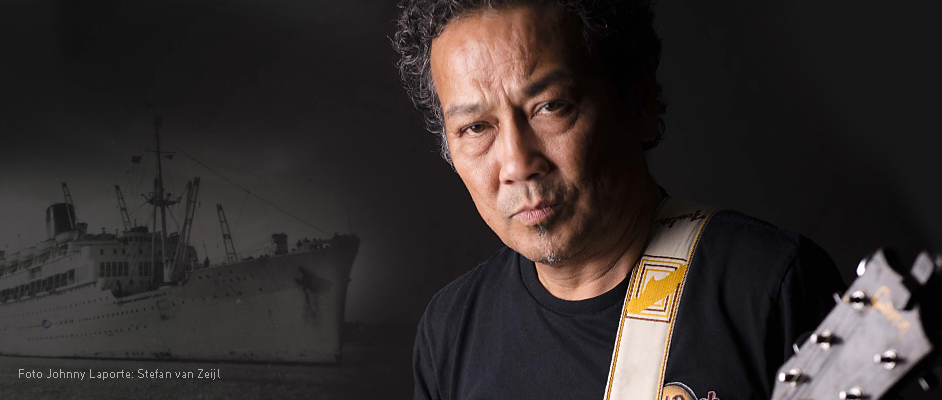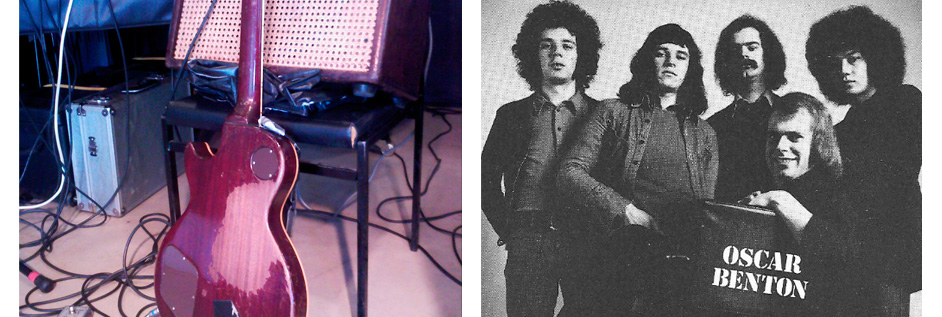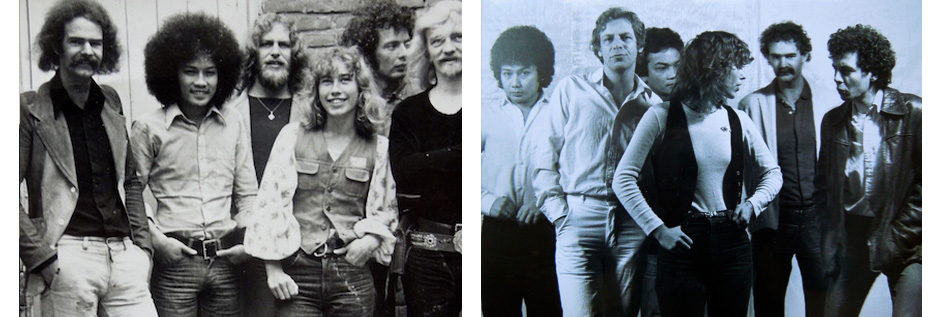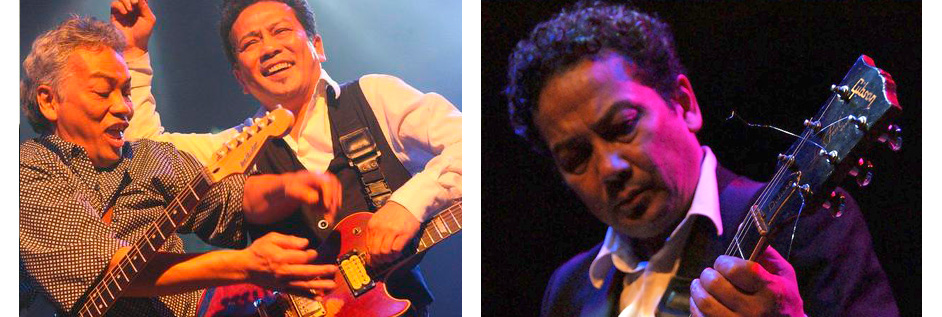


| OSCAR BENTON WEBSITE |
|---|
Guitarist Johnny Laporte knows how to give a special interpretation to the blues in his own way. Playing and composing in Barrelhouse – inducted into the Dutch Blues Hall of Fame in 2012 – the guitarist has been on stage continuously for more than 40 years. Off stage a quiet man who doesn't get easily knocked off the field. Johnny Laporte is all about playing and preferably as much as possible!
Text: Jan Blaauw - bluesgate.nl
Culture change
“I remember a childhood with birthday parties where there was always food, dancing and music. An uncle played the guitar, a few aunts played the piano and sometimes someone played the saxophone or the accordion. Indonesian songs, that was a wonderful time. Inevitably, Guus and I got into music at such a young age. But indo rock was driven out by English pop, which is why that musical movement has passed us by.”
The guitarist, born in 1952, emigrated with his family in 1958 from Medan, Sumatra to the Netherlands. John remembers that boat trip very well. “I was six when we left for the Netherlands. The boat with which we would make the crossing – The Oranje – was so big that we first had to take a smaller boat. Then climb aboard with rope ladders.” The arrival in the Netherlands mainly meant cold temperatures. Something Johnny wasn't used to. “It was winter and at first we were taken care of in a boarding house in the small Dutch village of Bergen. Food consisted of stew. I was not familiar with such meals and we were not used to them at all, so that was quite unusual.”
Six-year-old Johnny goes through it all. “I didn't know what to expect at all. All the impressions I gained, the changes that an emigration brings. As a child you see it as a great adventure and you just go along with it, not thinking about it. Eventually we went to live in Haarlem where I went to school. There I quickly connected with other children because there was no language barrier. To this day I am still in touch with a very good friend I met in elementary school. I remember he was around our place very often, he almost became family. And, as a Dutchman, he will soon emigrate to Indonesia. This is of course because of all those enthusiastic stories from us!” John smiles about it. “With family roots deep in Dutch and Indonesian history, I actually originated from the VOC.”
The beginning - John the Revelator en Oscar Benton
Playing a guitar himself only occurred to Johnny when his brother Guus Laporte started playing with John The Revelator. Johnny was then fifteen years old and had had piano lessons in the years before. But reading music was not a hobby. "Then I would play the piano and pretend to read those notes. My piano teacher didn't fall for that. John The Revelator originated at the Mendel College in Haarlem. "I went to performances and I thought it was a great band. But after returning from a family holiday in America, Guus found out that another guitarist had been recruited. The band found that one and a half month's absence too long an interruption. Guus was disappointed, but a short time later Oscar Benton was at our door.”"
"Oscar, who lived a few blocks down the road, asked Guus if he was free and if he would like to come and play with him. The Oscar Benton Bluesband consisted of four people at the time and a background guitarist was still needed. So Guus started playing guitar with Oscar. That was around 1968. I regularly went to see performances when they played in the area. Oscar was already known at that time because he had won a prize at the 'Loosdrechts Jazzconcours'. With a record deal linked to that he could record an album. In these days the media offer was only a fraction of what it is now. If you came on the radio, or even on television, there was a good chance that you were actually heard and seen gaining extra notoriety as a result.”
Development
Johnny Laporte himself was not involved in real blues at all. He, like so many at the time, listened to the Beatles and the Rolling Stones. “But because John The Revelator and later Oscar came to our house, I watched in the background how the process of making music actually went. I carefully tried to figure out something on guitar, but I found the Beatles too complicated and I really couldn’t figure out the Stones either. Until I understood during my brother's rehearsals that blues only consisted of three chords. I had to be able to get there somehow. So when Guus was gone I would grab his guitar and try to play the chords I had copied. That was a lot easier for me than this whole Beatles thing. I taught myself to play the guitar with the pickup. Needle on, needle off. Of course they were borrowed records. You could throw away the one by John Mayall with Clapton and Peter Green afterwards, haha. Clapton must have been around 20 when he played so well. Not surprising that people later said: Clapton Is God.”
“Because of all that practice I mastered the chords in an acceptable way. I had classmates who were also into guitarplaying. Between us it was like 'What do you play?' They came up with 'My brother plays 'Hide Away' by John Mayall and the Bluesbrakers. My answer was then 'I play that too!' When they arrived at their home, the brother played the song first and in the meantime I was examined with suspicion. Until I played the song on the guitar. Then it was like 'Wow, what's happening here?' And I really didn't master the song very well, but left the brother way behind me! Now, after all these years I know the song inside and out but I still can't get the song to sound like Eric Clapton did back in the day. I keep trying, haha.”br/>
“Guus bought his first guitar at the Wehkamp department store, a Shadow for 85 Dutch guilders. That guitar got me into the blues. At that time I didn't have my own guitar. When I started playing with Oscar neither, I played on a Gibson SG and that belonged to Guus. Later it was stolen at a blues festival in Amstelveen. Then I quickly bought another SG, but it was paid for by Barrelhouse. A few years later I bought the Gibson Les Paul Deluxe which I still use today. My first own guitar!”
Meanwhile, Oscar Benton and his band are doing well. Never change a winning team but Oscar wasn't afraid to turn things around when he saw fit. Or rather when the record company wanted it. John about this: “The record company would say, for example, that ‘you should actually replace the drummer’. That's how it went. A record company was simply dominant. It could happen that they replaced an entire line-up and then a completely different band played your songs. Recording in a studio cost a lot of money and if it didn't go fast enough, they intervened that way. In England that also happened with The Kinks, I was told. Their guitar parts and solos were played by Jimmy Page who was a studio musician at the time. We also had to deal with this in the Netherlands. So Oscar wanted to say goodbye to drummer Lonesome Tanny Lent (Herman Soeverein). And Tanny was one of the best drummers in the Chicago Blues style that I know.”



